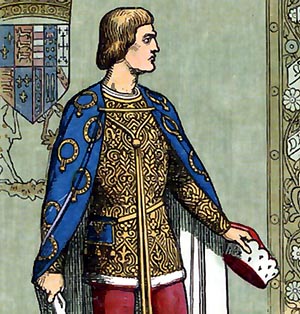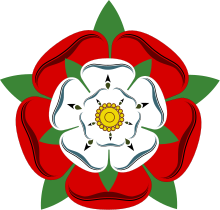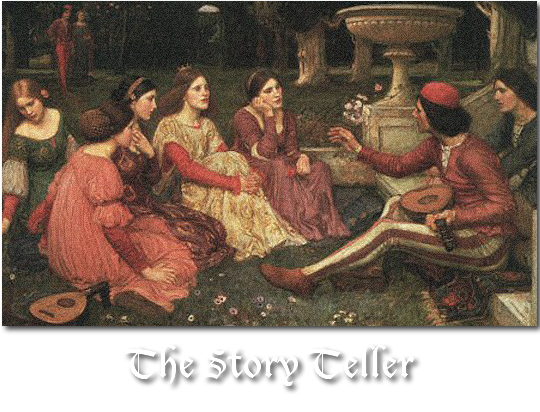My name is Margaret. Margaret of Anjou. I was fifteen then. I recollect those times in a haze almost. I remember sitting on the banks of Moselle with my grandmother, reciting stories. Stories of old, how she would keep Anjou out of the hands of the English, stories about the Hundred Years Wars and Joan of Arc. My mother too, when she had time to spare, would tell me of heroic battles that she had overseen when father was in prison, fighting for the the kingdom of Naples. Together, they taught me all they knew and I was blessed to be one of the most educated girl in all of France.
I was happy, truly unconditionally happy without any worries then. Until, William de la Pole, the soldier in the Hundred Years Wars approached my father for an alliance between Henry VI and me, Margaret of Anjou. At first, I was hesitant, after all the we have been fighting the English for Hundred Years! Soon, I learnt that this was a noble attempt to restore peace between the two nations and will restore Anjou and Maine unconditionally to French hands. So, with ideas of peace, I married Henry VI, King of England.
Little did I know then, that my lot in life was not peace.
I was the Quene of England.
Unfortunately, I could sense unhappiness among the English. Their people had been ravaged by war just as much as the French had. However, in their eyes, the French were at fault and my mere presence bore them a repugnance that was visible in those fawning eyes feinting flattery. I also donned a diplomatic mask and met these smiles with marked civility in court. I may be French by birth, but I had now dedicated myself to England, as is my duty to the Crown.
I listened with interest. However, there was nothing to be said as the law required an heir and that the House of Lancaster did not have. Under William's advice, I tried to remove him with the best assassins but he lived without doubt about his claim. That is, until my Edward was born in 1453. To my chagrin, Richard was named Lord Protector of the infant in light of the temporary mental illness that gripped Henry. On another line, both me and Henry had shared a dream of education and reformation and I set-up the Queen's College at Cambridge in his absence.
Soon Henry recovered and tactically removed the threat, Richard from the court.
Richard of York took arms in 1455 to fight for his right to the throne beginning a civil war.
An unrest had been simmering all along on the English loss in the Hundred Years' War, taxes and the famous Percy-Neville feud. Also, everyone swore their allegiance to their immediate lord, not to the respective side. It diluted power. English blood boiled, waiting to be spilled.
I observed all these factors and above all, this hatred rose in my heart against the one person, Richard of York. I wanted to secure the throne for my son.
The first battle took place at the capitol, St.Albans. We lost. Richard killed the powerful members of our side. Henry collapsed mentally and was found in a tent quietly musing. Richard was once again Lord Protecter.
Both Houses were shocked at the bloodshed. They sought dialogue to come to a peaceful solution. I allowed my mask to fall. I made it very clear that Edward of Westminster, my son, is the next heir. Henry recovered and sent Richard to Ireland. We also moved away from the angry over-taxed merchants of London and set court in the country at Coventry. Slowly, we built our army through conscription, an order for all youth to participate in this civil war.
Oh yes, now I recollect that preposterous venture of Thomas Bourchier who celebrated Love Day in honour of complete peace between the two houses in 1458. Hostilities continued the next year when the deported Richard returned illegally from Ireland. After a loss at the Battle of Blore Heath, we won at the Battle of Ludford Bridge.
Seizing this opportunity, we ordered all the confounded members of the Yorkist faction attainted, that is denounced their noble blood status. Alas, they won at the Battle of Northampton in 1460 where Henry became a prisoner.
When Richard thought he had won, he was wrong. It was I who led the House of Lancaster now and may I say with pride, we won the Battle of Wakefield. Meanwhile, with many adventures, I had escaped to Scotland to protect the heir. I struck a chord with the Queen of Scotland and she agreed to send troops in exchange for Berwick-upon-Tweed for this battle.
Richard was killed in this battle and it was with great satisfaction that I ordered his head to let rot at the city of York.
Finally, I thought my child is safe.
How very wrong I was.
Richard had a son who had survived, Edward, who led the Yorkist forces now. We lost the Battle of Mortimer Cross due to his ludicrous superstitious speeches about seeing three suns. We won the Second Battle of St.Albans. I took particular pleasure in executing the two knights who were trying to ransom the king.
Alas! The biggest battle, the Battle of Towton, near York, we lost. Our family fled. The few surviving leaders changed sides. Edward of York beheaded John Clifford, my best man who had ,in turn, killed his brother.
Richard's son, Edward IV was crowned King of England. He married some Woodville, I cannot recollect. I think Elizabeth Woodville. Seeing the corruption and the rise in the nobility of the Woodville family, his most powerful and richest ally, the Earl of Warwick, a Neville, by the way, joined our side, bless him. My Edward married his daughter.
There were many, many battles after that. We won some, lost some. The King temporarily lost service. I draw now to the close of my story.
The Battle of Tewkesbury, 4 May 1471. I will not, cannot forget it. We had just returned from our long exile to join the triumphant forces only to realise that the news relayed to us, in Scotland, was out-dated. We entered into the battlefield.
My son, Edward, was killed.
After that, there was no spirit in me. The very reason for my existence just faded right in front of my eyes. I was imprisoned in England. Henry was murdered.
I was ransomed by the French king in 1475.
There is nothing left for me to add. I once again look at the clear waters of the Moselle only now they ripple with the faces of those long gone. In my haste to protect and honour the one life that I helped create, I do not know, how many I helped extinguish. I failed to realise the mortality of my own son's life. It seems ironic, that today, the 23 March 1480 marks half a century in my life and I have witnessed both the principalities of the war die, Richard and my husband Henry VI. I am old, so old, just living in total poverty through the sympathies of others. My son lived to see just seventeen summers. I stop my story here. May God forgive me, I think I have been punished enough.
This narrative is continued by Margaret of Lorraine, her niece after Margaret's of Anjou's death in 1482.
Well, news poured into France. Edward IV died of an illness. He named his brother Richard as Protector. Preparations were being made for his son's coronation. Richard had other plans, of course and murdered the 11 year old and the 9 year old princes in the Tower of London. He was crowned Richard III.
Henry Tudor, the Lancastrian candidate revolted at Buckingham against Richard which failed. Finally, Henry won the Battle of Bosworth field in 1485. Richard III was killed.
The House of Lancaster had won.
Henry Tudor, a man of infinite wisdom, married the daughter of Edward IV of York and created the Tudor line and was crowned Henry VII.
My aunt never lived to see the final victory. Henry VII joined the two symbols the Red Rose of Lancaster and the White Rose of York into the Tudor Rose ending the War once and for all. I think, historians will probably come to call it the War of the Roses. How ironic!
In my opinion, the entire exercise was futile. The Richards, Edwards and Henrys were all killed. The ones who started this war were killed. Thirty years of Civil War from 1455 to 1485. England lost some of her best soldiers. The Battles were complicated and some times, chivalry was missing too. But as my aunt said, blood was boiling in English men, waiting to be spilled. They would have probably fought over another reason anyway. Peace exists now between and within England and France.
I was happy, truly unconditionally happy without any worries then. Until, William de la Pole, the soldier in the Hundred Years Wars approached my father for an alliance between Henry VI and me, Margaret of Anjou. At first, I was hesitant, after all the we have been fighting the English for Hundred Years! Soon, I learnt that this was a noble attempt to restore peace between the two nations and will restore Anjou and Maine unconditionally to French hands. So, with ideas of peace, I married Henry VI, King of England.
Little did I know then, that my lot in life was not peace.
I was the Quene of England.
Unfortunately, I could sense unhappiness among the English. Their people had been ravaged by war just as much as the French had. However, in their eyes, the French were at fault and my mere presence bore them a repugnance that was visible in those fawning eyes feinting flattery. I also donned a diplomatic mask and met these smiles with marked civility in court. I may be French by birth, but I had now dedicated myself to England, as is my duty to the Crown.
 |
| Richard of York |
Five years after I married Henry, Richard of York had been named as the successor to the throne in absence of an heir. I was, well, confused. It was la Pole who explained all the politics that I was a stranger to.
 |
| Henry VI of Lancaster |
My husband had ruled England since he was a mere baby, with regents acting on his behalf and incapable of taking decisions. We belonged to the House of Lancaster. Richard, from the House of York, claimed ascendancy to the throne based on an impressive family history. He explained to me that his actions had foiled an attempt to reconcile the rival dukedoms who had contemplated an inter-marriage. He told me about the corrupt courtiers that Richard had won and his gaining popularity.
Soon Henry recovered and tactically removed the threat, Richard from the court.
Richard of York took arms in 1455 to fight for his right to the throne beginning a civil war.
An unrest had been simmering all along on the English loss in the Hundred Years' War, taxes and the famous Percy-Neville feud. Also, everyone swore their allegiance to their immediate lord, not to the respective side. It diluted power. English blood boiled, waiting to be spilled.
I observed all these factors and above all, this hatred rose in my heart against the one person, Richard of York. I wanted to secure the throne for my son.
The first battle took place at the capitol, St.Albans. We lost. Richard killed the powerful members of our side. Henry collapsed mentally and was found in a tent quietly musing. Richard was once again Lord Protecter.
Both Houses were shocked at the bloodshed. They sought dialogue to come to a peaceful solution. I allowed my mask to fall. I made it very clear that Edward of Westminster, my son, is the next heir. Henry recovered and sent Richard to Ireland. We also moved away from the angry over-taxed merchants of London and set court in the country at Coventry. Slowly, we built our army through conscription, an order for all youth to participate in this civil war.
Oh yes, now I recollect that preposterous venture of Thomas Bourchier who celebrated Love Day in honour of complete peace between the two houses in 1458. Hostilities continued the next year when the deported Richard returned illegally from Ireland. After a loss at the Battle of Blore Heath, we won at the Battle of Ludford Bridge.
Seizing this opportunity, we ordered all the confounded members of the Yorkist faction attainted, that is denounced their noble blood status. Alas, they won at the Battle of Northampton in 1460 where Henry became a prisoner.
When Richard thought he had won, he was wrong. It was I who led the House of Lancaster now and may I say with pride, we won the Battle of Wakefield. Meanwhile, with many adventures, I had escaped to Scotland to protect the heir. I struck a chord with the Queen of Scotland and she agreed to send troops in exchange for Berwick-upon-Tweed for this battle.
Richard was killed in this battle and it was with great satisfaction that I ordered his head to let rot at the city of York.
Finally, I thought my child is safe.
How very wrong I was.
Richard had a son who had survived, Edward, who led the Yorkist forces now. We lost the Battle of Mortimer Cross due to his ludicrous superstitious speeches about seeing three suns. We won the Second Battle of St.Albans. I took particular pleasure in executing the two knights who were trying to ransom the king.
Alas! The biggest battle, the Battle of Towton, near York, we lost. Our family fled. The few surviving leaders changed sides. Edward of York beheaded John Clifford, my best man who had ,in turn, killed his brother.
Richard's son, Edward IV was crowned King of England. He married some Woodville, I cannot recollect. I think Elizabeth Woodville. Seeing the corruption and the rise in the nobility of the Woodville family, his most powerful and richest ally, the Earl of Warwick, a Neville, by the way, joined our side, bless him. My Edward married his daughter.
There were many, many battles after that. We won some, lost some. The King temporarily lost service. I draw now to the close of my story.
The Battle of Tewkesbury, 4 May 1471. I will not, cannot forget it. We had just returned from our long exile to join the triumphant forces only to realise that the news relayed to us, in Scotland, was out-dated. We entered into the battlefield.
My son, Edward, was killed.
After that, there was no spirit in me. The very reason for my existence just faded right in front of my eyes. I was imprisoned in England. Henry was murdered.
I was ransomed by the French king in 1475.
There is nothing left for me to add. I once again look at the clear waters of the Moselle only now they ripple with the faces of those long gone. In my haste to protect and honour the one life that I helped create, I do not know, how many I helped extinguish. I failed to realise the mortality of my own son's life. It seems ironic, that today, the 23 March 1480 marks half a century in my life and I have witnessed both the principalities of the war die, Richard and my husband Henry VI. I am old, so old, just living in total poverty through the sympathies of others. My son lived to see just seventeen summers. I stop my story here. May God forgive me, I think I have been punished enough.
This narrative is continued by Margaret of Lorraine, her niece after Margaret's of Anjou's death in 1482.
Well, news poured into France. Edward IV died of an illness. He named his brother Richard as Protector. Preparations were being made for his son's coronation. Richard had other plans, of course and murdered the 11 year old and the 9 year old princes in the Tower of London. He was crowned Richard III.
Henry Tudor, the Lancastrian candidate revolted at Buckingham against Richard which failed. Finally, Henry won the Battle of Bosworth field in 1485. Richard III was killed.
The House of Lancaster had won.
Henry Tudor, a man of infinite wisdom, married the daughter of Edward IV of York and created the Tudor line and was crowned Henry VII.
My aunt never lived to see the final victory. Henry VII joined the two symbols the Red Rose of Lancaster and the White Rose of York into the Tudor Rose ending the War once and for all. I think, historians will probably come to call it the War of the Roses. How ironic!
 |
| White Rose of York |
 |
| Tudor Rose |
 |
| Red Rose of Lancaster |
FINIS





at the outset, thank you , thank you and thanks a million times :) :) :) for postin this
ReplyDeletedint now that the war was so complicated b4 readin this. apart from the fact that people in those times lacked imagination when it came to namin their kids, its funny how the percy-nevilles who switched sides often seem to hav been an inspiration for politicians today:P
Many lunch times ago, when the great indian story teller told her favourite not-so-indian story of the war of the roses, a few default listeners never gave her due. This story just had to be here.
ReplyDeleteIt surely must please you- I read the whole complicated thing.
All the stupid, whimsical, megalomaniacs down there in hell(these kings and queens) might find it quite remarkable that many centuries later, a certain educated sowmya would dedicate so much her time and effort to beautifully record their escapades.....